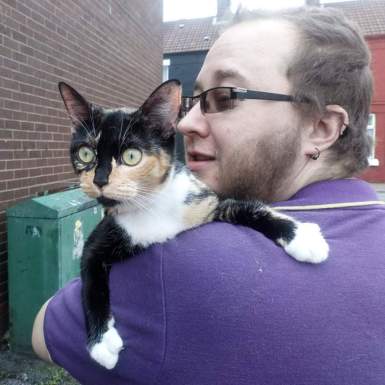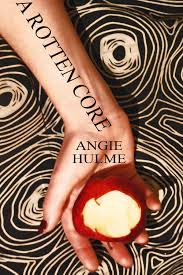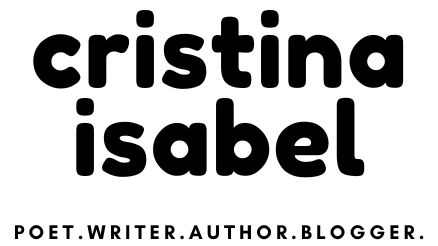
BIO:
Lee has been writing for as long as they can remember, and enjoys consuming and engaging in storytelling of all kinds, the more diverse the better. As a firm advocate for feminism, racial equality and LGBTQI rights and mental health awareness, and also a non-binary transgender male, diversity is of high import and Lee tries to show this in their own stories. But whether writing, consuming media, or fighting social inequality, Lee is probably being sat on by a cat.
AUTHOR Q&A:
- When did you first realize you wanted to be a writer?
LH: It was never a realisation, so much as I just liked writing and wanted to do it, and share it. I always figure that “being a writer” is just the act of writing, so if I do that I’m a writer whether I consciously chose to be one or not.
- What is your work schedule like when writing a book?
LH: I’m going to take these two together because the answers are interconnected. All my life I’ve dealt with mental health problems, including hypomania, depression, self-harm, paranoia, anxiety, gender dysphoria, etc. I was undiagnosed and wrongly diagnosed and untreated and wrongly treated for most of my life. It was only a few years ago that I both realised I was transgender, and found a diagnosis and medication for being bipolar (later specified to bipolar 2) both of which feed into each other and all the other problems.
Because of the issues I have, I can go for long periods where I’m unable to write due to what’s going on inside my head, or things that are affecting me on the outside. Sometimes I simply can’t even face the thought of it, sometimes everything I write just looks like trash, sometimes I just can’t even try to begin.
All of which is to say that it can take me months to years to write a new thing, never mind get it edited and polished, then get a cover and publish it. It’s the reason for year-long gaps between my books coming out, or me getting anything new done. And my schedule when doing all of this is whatever I can do, whenever I can do it.
I can’t do the “write every day no matter what” thing, it’s simply not possible, but I learned that feeling bad about it just makes it harder, so I do what I can, and remind myself that if it’s the best I can do, then it’s enough.
3. Where do you get your ideas or information for your book?
LH: Ideas come from everywhere. I keep long lists of thoughts and ideas I have for stories, or parts of stories, or things I’d like to see or include. I wrote After the Fairytale after seeing an advert for Cinderella 2 and going on a rant about trauma and happily ever after being bullshit. I wrote A Rotten Core over the course of years, at some point I realised I had a bunch of stories that would fit together and just needed a few more, so I wrote some. Sometimes it’s a dream, or something someone said, it varies wildly but my head makes connections and my imagination goes to work, and there the next thing is.
As for information – the internet, mostly. If I know someone I will ask for pointers on where to look, or for clarification on things, but I prefer to not use up someone’s time unless I can pay. As long as I know how to look for what I need – reliable sourcing, etc – then I’ll do my best to find what I need.
Growing up it was the library, and I developed the habit of just making new stuff up so I couldn’t make any mistakes, but having info at my fingertips nowadays is really helpful.
4. When did you write your first book?
LH: I was 18/19, so around 2001 – Disbelief (still available to buy if you’ll forgive the youngster in me). It started as a short story, and turned into something of a long novella about the death of ancient gods, and it was also my first attempt to advocate for what was, at the time, my lesbian sexuality (during the years before realising I was trans).
Clunky though some of it undoubtedly was, and despite the odd exposition dump, I still like the story.
5. What do you do when you’re not writing?
LH: I play games – video, board, and tabletop, watch films and tv, walk the dog, play with the cats, hang out with my (amazing) partner and friends. I also work with an indie media company called 8 Sided Films.
6. What does your family think of your writing?
LH: I’m not in touch with most of my family, so I don’t know about them. Those that I am, I don’t know, I don’t think they read my writing much, and I’m ok with not pushing the subject.
My chosen non-blood family, though, they proclaim to enjoy it a lot, and my partner tends to race towards anything new I write, and is brilliant for bouncing ideas off.
7. What was the most surprising thing you learned in creating your books?
LH: That despite not being a plotter (I wing most of it, except for specific bits), my subconscious mind is always a few steps ahead of me. I’ve learned over the years to trust that in the background, things are being fit together, although I’ve had a few inner conversations about not warning me when someone is about to die!
Given my mental health problems, not being able to trust my own mind has been a regular feature. So that’s a big deal.
8. How many books have you written? Which is your favorite?
LH: 6 book total. A couple of them I’ll admit are not so great, but I have a soft spot for them all, and for the me that wrote them. My favourite published is probably A Rotten Core. I really enjoyed dissecting fairytales and creating new narratives, and entirely new tales, and I surprised myself in my interpretations at times.
But each new one tends to step up so right now the book in editing is gonna be my favourite, but I can already see the next one readying itself to take over!
Maybe I just like new shiny things, or maybe I put extra love into what’s most recent in order to get it out there and be genuine in asking people to read it. Who can say?
9. Any tips/suggestions on getting started?
LH: Don’t overthink it: start writing. Start writing a scene description or a conversation, or a narrative, or just an idea. It doesn’t matter what it is, you can change and fix and edit and rewrite later, just fill the page.
10. What do you think makes a good story?
LH: It depends on what the writer is trying to convey. Sometimes the actions of the characters matter less than the setting in which they happen. Sometimes what they say tells you everything you need to know. Sometimes watching them do whatever they’re doing is what draws you in and keeps you going. Not every story is right for every reader, either, because we all want different things, at different moments.
The best thing that makes a good story, I think, is that you, the writer, enjoys the tale you’re telling. Even if it’s hard, even if it makes you want to smash your computer at times, if you need to keep going, to know your characters, to find out what happens, that’s going to translate to the people reading more than trying to anticipate what they want and writing that. Be true to the story you’re telling and it’ll come through.
11. As a child, What did you want to do when you grew up?
LH: Something that helped people. Something I enjoyed. Something where I could share stories. I’ve never really had career goals, just those ideals.
LINKS:
http://twitter.com/leehulme.com
https://www.smashwords.com/profile/view/leehulme
Published Work:

